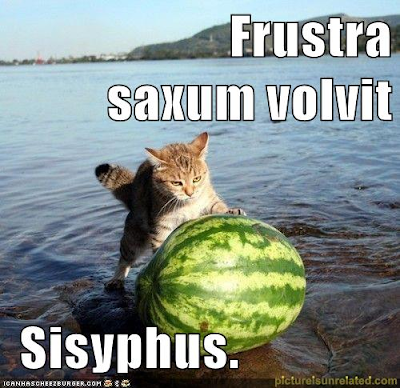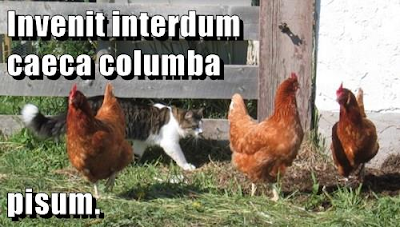The first mythological character you will meet is Atlas, one of the Titan gods of ancient Greece. After the Olympian gods, led by Zeus, defeated the Titans, Atlas was condemned to hold the heavens on his back for all eternity. You can find out more at Wikipedia: Atlas. Because of the association between Atlas and the whole cosmos, his name came to be associated with the collection of maps that we call an "atlas." Here's a famous sculpture of Atlas holding up the cosmos:
You will also meet Sisyphus, who was condemned in the afterlife to roll a rock up mountain, but never was never able to reach the top; the rock keeps rolling back down for all eternity. You can find out more at Wikipedia: Sisyphus.
To begin, here is a little slideshow (with cats) of the words you have seen before:
And here are today's proverbs:
1. Atlas caelum.
Atlas (holds up the) heavens.
Atlas caelum.
Atlas is in the nominative case here, while caelum is in the accusative, the object of the verb.
But where is the verb? The verb is implied here, based on people's familiarity with the myth: Atlas holds up the sky; that's just what he does.
You've seen some other proverbs with implied verbs in this earlier lesson: Capra gladium and Cornix scorpium.
The elliptical saying warns people to stay out of trouble. Don't get involved in a war with Zeus: otherwise, you might end up like Atlas, carrying the whole world on your back.
2. Nauta aratrum poscit.
(A) sailor demands (a) plough.
nauta a-RA-trum poscit.
The masculine noun nauta is one of those masculine nouns from the 1st declension, ending in -a. Many of these 1st declension masculine nouns are Greek in origin, and that is true here: nauta is the Greek word for "sailor" (ναύτης / naútēs), and you can see this root in English "astronaut," sailor among the stars.
2. Nauta aratrum poscit.
(A) sailor demands (a) plough.
nauta a-RA-trum poscit.
The masculine noun nauta is one of those masculine nouns from the 1st declension, ending in -a. Many of these 1st declension masculine nouns are Greek in origin, and that is true here: nauta is the Greek word for "sailor" (ναύτης / naútēs), and you can see this root in English "astronaut," sailor among the stars.
The neuter noun aratrum means "plough," and you can see this root in English "arable." Because nauta is in the nominative case, you know that aratrum is in the accusative case.
The verb poscit means "demand, requires, asks for."
This is one of those proverbs about people acting foolishly: a sailor has no need of a plough, so it's foolish for him to request one.
3. Speculum caecus poscit.
(A) blind (man) demands (a) mirror.
SPE-culum caecus poscit.
This is another proverb about someone asking for something that they do not need and cannot use, just like the sailor and the plough in the previous saying.
Note the word order this time: the object comes first, speculum, and then the subject, caecus, and then the verb, poscit.
4. Frustra saxum volvit Sisyphus.
Sisyphus rolls (the) stone in-vain.
frustra saxum volvit SI-syphus.
The word frustra is an adverb: "uselessly, in vain, to no purpose."
4. Frustra saxum volvit Sisyphus.
Sisyphus rolls (the) stone in-vain.
frustra saxum volvit SI-syphus.
The word frustra is an adverb: "uselessly, in vain, to no purpose."
The verb volvit means "turns, rolls," and you can see that root in English "revolve."
Here the word order is different yet again: an adverb first, then object of the verb, saxum, then the verb, volvit, and the subject last of all: Sisyphus.
5. Invenit interdum caeca columba pisum.
(A) blind dove once-in-a-while finds (a) pea.
IN-venit in-TER-dum caeca co-LUM-ba pisum.
The word interdum is also an adverb, "once in a while, sometimes, meanwhile." The word is a compound in Latin, inter-dum, "between-while," i.e. "meanwhile."
Here the word order is different yet again: an adverb first, then object of the verb, saxum, then the verb, volvit, and the subject last of all: Sisyphus.
5. Invenit interdum caeca columba pisum.
(A) blind dove once-in-a-while finds (a) pea.
IN-venit in-TER-dum caeca co-LUM-ba pisum.
The word interdum is also an adverb, "once in a while, sometimes, meanwhile." The word is a compound in Latin, inter-dum, "between-while," i.e. "meanwhile."
The neuter noun pisum, "pea," is the origin of English "pea."
Because caeca columba is in the nominative, that lets you know that pisum is in the accusative.
You can see yet another word here: verb, invenit, adverb, interdum, subject, caeca columba, and then the object, pisum.
Compare the English sayings "Sometimes a blind pig finds a truffle" and "Even a blind squirrel finds a nut once in a while." There are similar sayings in other European languages too; for example, German: Auch ein blindes Huhn findet mal ein Korn, "Even a blind chicken can sometimes find a kernel."
Here's a recap:
Plus the LOLCats!
Here's a recap:
- Atlas caelum.
- Nauta aratrum poscit.
- Speculum caecus poscit.
- Frustra saxum volvit Sisyphus.
- Invenit interdum caeca columba pisum.
Plus the LOLCats!







No comments:
Post a Comment
Comments are limited to Google accounts. You can also email me at laurakgibbs@gmail.com